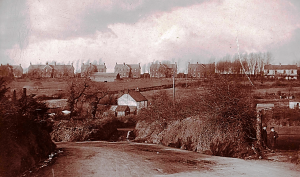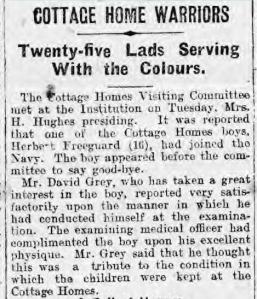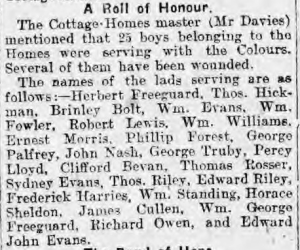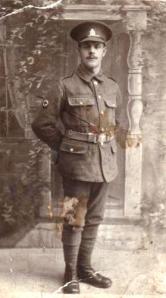Revised 1 July 2016
My garden today 1 July 2016
Today the first day of July 2016 is a day when innumerable young men and boys lost their lives at the Somme. I feel it’s a perfect time to update this post and link to the immensely moving tribute happening today in railway stations across Britain. https://twitter.com/i/moments/748803572091883520
God bless you all
The First World War was never far from my mind while researching pauper children in the late nineteenth and early twentieth-century. Boys who were 8 or 9 years old in 1905 would be old enough to ‘join the colours’ when war broke out in 1914. My PhD research focussed on the period between 1834 and 1910. One of my reasons for not continuing into the First World War was my reluctance to encounter ‘my’ lovely young boys and girls grown up (barely) and gone to war.

Swansea Cottage Homes on the brow of the hill, c 1910.
Recently, while searching the wonderful Cymru 1914 database I stumbled on the article (below) about the cottage homes where many of Swansea’s pauper children were sent after 1877. Although I knew it was bound to happen it came as a huge shock and quite frankly I cried my eyes out.
Cambrian Daily Leader, 27 October 1915
So many familiar names. George Palfrey was one of five siblings who were all brought to live in the cottage homes by the local NSPCC inspector and their mother was subsequently imprisoned for neglecting them. His older sister Harriet appeared to be very attached to the homes and visited on many occasions after she left in 1908.
Willie Standing came to the homes because his mother Lizzie was described as a prostitute and was adopted by the guardians. He was subsequently placed with a farmer but ran away and reported to the police that he had been beaten by his employer who was investigated by both the police and the guardians.
Percy Lloyd was hardly mentioned in the records I have consulted apart from some time spent in the workhouse infirmary. In the Cambria Daily News in 1916 it was reported that Percy Lloyd had been killed.
Although there are huge opportunities opening up for exciting research into these young people’s war, part of me feels that they shouldn’t be the subject of a historian’s curiosity. And, although I believe respectful research, commemoration and remembrance of the people of the First World War during the next four years will be vital for the understanding of future generations, I feel with these boys its rather personal as I have spent so much time getting to know them over the last five years.
Whatever my reservations, this is research that I can’t NOT do and I hope it will produce happier news for my cottage homes boys.
Am I being too emotional? I believe emotional engagement with our research enhances scholarship rather than undermining ‘objectivity’. Some of the best (and most rigorously researched) historical blogs are written by historians who have ‘come out of the emotional closet’ to quote Joanne Bailey . Similarly, Helen Rogers’ emotional commitment to her nineteenth-century convicts lads enriches an already superb blog.
George Evans
In the meantime to end on a more hopeful note, one boy George Evans (above) although not mentioned in the above article survived the war. In 1914 at the age of 20 George joined the South Wales Borderers. He transferred to the Liverpool Regiment and was wounded in France and sent home for several weeks. He then joined the Mediterranean Expeditionary Force in 1915 and was posted to Gallipoli.
In 1916 he was again wounded in France and in 1917 he transferred to the South Lancashire Regiment. In 1918 he married Elizabeth Cameron and was demobbed in 1919. He returned to his early career on the railways and died in Swansea in 1973 at the age of 79.
I know so much about George Evans (and his lovely sister Violet) because Violet’s son and grandson Donald and Allister Bibey contacted me and shared their family history research. I was thrilled to be able to answer many of their questions and solve some mysteries using my own research. Cooperation between local, family and academic historians can enhance everyone’s research and I hope to work more closely with many of these very knowledgeable and enthusiastic historians in the future. Everyone’s a historian after all.
There are many sources relating to Cockett Cottage Homes, Swansea in West Glamorgan Archives Service (WGAS) in Swansea.





This is a lovely post Lesley and thanks for comment on my blog!
You must follow up what happens to the cottage boys and girls after the outbreak of war. Over the next few years we are going to hear lots about people’s wartime experiences but, to appreciate these, we need to know about who they were before the war.
It will be especially interesting to find out how young men (and women too?) who had been through complex and sometimes traumatic family experiences and then adapted to residential ‘home’ life, encountered ‘institutional’ life in the forces, or as nurses, munitions workers etc. Did surviving early childhood trauma help them deal with wartime challenges or were they more likely to experience trauma again?
I’m also struck by the loyalty some of the former cottage children felt for these homes and the people who raised them. In recent years historians have been so sceptical of Victorian philanthropy and its claims that we’ve neglected to examine such relationships and what they might reveal about care and attachment. It’s good to see a new generation of historians (including jane Hamlett, Lesley Hoskins, Claudia Soares, Laura Mair and, of course, Lesley Hulonce) who are beginning to tease out the myriad ways in which institutions and ‘homes’ were experienced and how these could be sites of nurture, kindness and love, as well as neglect, abuse and exploitation.
Thank you Helen and your point about knowing people’s pre war experiences is very insightful. I hope to be able to address many of the questions you pose in the next few years and thank you for your insight.